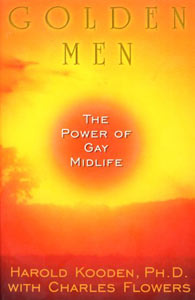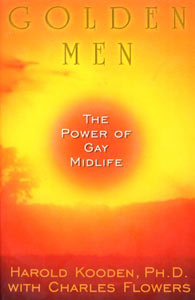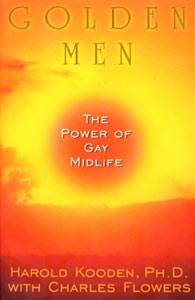The Golden Boys
"Golden boy" was commonly used back in the 1950's and 60's to describe the hot young guy in town -- with an emphasis on young. Gay clinical psychologist, Harold Kooden, Ph.D. and his co-author, Charles Flowers, offer a refreshing update to this expression.

How does coming out affect the gay man's experience with aging?
The coming out process builds incredible strength. We tend not to pay attention to it because we're so focused on the scary part. Unlike the gay man, the non-gay man rarely has the experience of putting every bit of his social, family and professional world at risk in order to make an ethical change in his life. Gay men build a reservoir of strength when turning to a new group for support.
What's so scary about getting old?
When I started the book, I thought about various questions I'd asked gay men over the years, and one in particular came to mind: If no matter what your age, you would always be able to find and relate to gay men who you found attractive and who found you attractive, would you be as concerned about aging? And practically everyone said, "Well, no." So, the fear is I'm no longer attractive. And it's assumed that someone 40, 50, 60 or 70 cannot be seen as sexually attractive.
Does it have to do with feeling attractive, or do we really fear being alone as we age?
I don't think as much of it is fear of being alone, because gay men have built, by and large, a group of friends around them. It's more about not feeling attractive. The whole experience of walking down the street and getting cruised, for many gay men, has nothing to do with sex. They sometimes do end up having sex, but what they were really interested in was that moment of mutual acknowledgement.
If you base your sense of attractiveness on how much hair you have on top of your head, as you age and lose hair, you think, "I've lost attractiveness." You must build a more appropriate set of standards. A man who is sixty is not going to take on the same standards as someone who is twenty-five.
What is the difference between gay aging and non-gay aging?
Gay men are much more flexible and able to take care of themselves. We also have an emotional support system that most non-gay men don't have. We have friends, people we can relate to emotionally. Plus we're more able to do things like dishes, cooking, the laundry, taking care of ourselves in general. What happens to a lot of non-gay men in aging is that they experience a sort of emasculation.
If a non-gay man is married, he's tended to let his wife take care of all the emotional parts of his life -- she makes the friends and does the socializing. He may have friends he goes out with, but there's no one he can talk to. Often, his existence is defined as a job. When he retires, he loses his way of defining himself. There's an actual syndrome in which men have heart attacks within their first year of retirement.
In your book you discuss the different types of aging.
Right, the four ages. There's the chronological age, which starts the day we were born. Most people answer with this age when they're asked how old they are. Then there's the physiological age, which is how well a person has taken care of himself.
For example, for a man who is, say, 40 years old, who has stopped exercising, smokes heavily, drinks heavily, overeats, etc., his body may be measured in terms of being 50, 55. Whereas another 40 year old, who does exercise, doesn't do anything in excess and is very mindful of what he eats, may be physiologically 35.

Men can sometimes have sex for years with other men, but gay age starts when he says, "The community I am part of is the gay community." A lot of times in my work I would see two men in a coupled relationship who were approximately the same chronological age, but one had come out 20 years before, and the other had been out only five years.
How did that affect their relationship?
Very badly, because they were both at different stages of life. That's why, given these four ages and their complexity, maybe chronological age is really not a very good indicator of who somebody is or how far along the path he or she has come.
What are some guidelines to help gay men who are aging?
My book has five principles for gay aging. The first one, "By virtue of coming out, gay men already possess the power to age well." Going into midlife is like coming out a second time. Like the first time, you have to look for a new support system and focus on a broader group of peers and say, "You are now the people who I'm going to relate to. You're the ones who are going to give me support. I'm part of who you are." By peers I mean people who see you as being an exciting, vibrant, attractive man, regardless of their chronological age.
The next principle is called, "Midlife is our true adulthood." We start out socially much later than non-gay people. We don't get the high school or grammar school dating or the television role models. We're exposed to very little about our development and our lifestyle. So what we have to do is basically pick ourselves apart and reconstruct ourselves, because most of us have grown up with very negative feelings about being a gay man.
Are attitudes changing as TV and film expose people to positive gay themes?
Yes, it's definitely going to change things, but there's a long way to go. It's the old adage: If there are four gay-themed Hollywood movies out of a thousand, people say, oh, we're having a gay epidemic. There can be 50 articles about non-gays in a magazine, but let there be 4 or 5 about gays, and all of a sudden it's the gay agenda. Yes, there is a positive influence in the media, but you have to really look for it. It's no different than racism in this country. A lot is being done to combat racism, but it still exists. The same goes for homophobia.
I've heard so many men say to me: "I don't know what happened! I seem to have gone from a feeling of adolescence to being middle age." This feeling is absolutely normal.
One reason why gay men age better is because an important part of aging is how we feel, and if how we feel is based on internal structures rather than what society tells us, things like retirement and diminishing sexual activity are not such a threat.
The third principle, "The mind and the body are one," says that how a person ages is really determined by the individual. We can determine how we want to age, we have control over it, but it means we have to be active and take charge.

Greatly. The mind and body are integrated, and how we think affects how we feel, how we act and how our body responds. Because of this interconnection, you can't go around in a negative frame of mind without it somehow affecting you physically. I don't want to go so far as to frighten people off and say it's an Eastern book. But we need to realize that we have control over how we think and feel. We're not helpless.
What are some common negative thoughts that impede a healthy aging process?
People feel they have no control over their diet or how their body functions, that there's nothing they can do to change the fact that, oh, their mother had a heart attack at age 60, or their father died of cancer. They feel that somehow, the fate of their lives is all determined by their genes.
What are some common negative thoughts that impede a healthy aging process?
People feel they have no control over their diet or how their body functions, that there's nothing they can do to change the fact that, oh, their mother had a heart attack at age 60, or their father died of cancer. They feel that somehow, the fate of their lives is all determined by their genes.
Got it. So it's attitude over genetics.
Totally. The fourth principle, "Ageism causes death," actually came from watching my lover die. A number of my clients have said they were more fearful of growing old or changing than they were of dying. I've seen so many men, like my lover especially, who've never really had a good image of themselves as an older man. Many gay men are so terrified of getting old that they open their bodies up to deterioration, and sometimes have no motivation to take care of themselves.
Your fifth principle says, "You can not only survive, but thrive."
When we go through a crisis, we usually want to resolve it and go back to how things were. In actuality, after a crisis, people either deteriorate or they end up becoming stronger than they were before. Given the lifestyle that we have -- the coming out process, the struggles we have to go through -- we thrive. We are stronger for having gone through it.
After a crisis, isn't there always a little bit of deterioration before you can thrive?
There has to be. Some people talk about it in negative terms. For example, if someone ends up going into a mental hospital, often people would say it's negative, but I'd say the process of breaking up the old patterns to reassemble the new is a positive one.
How should your book be used as a learning tool?
I would love to see gay men get together and use it as a model for healthy aging. Each week, they could cover a chapter, come together and talk to each other about what they're doing, how they feel, what they've learned. This is also a way of building an intimacy among gay men.











 Printable Version
Printable Version











Reader's Comments
Be the first to leave a comment on this page!
Please log in to use this feature.